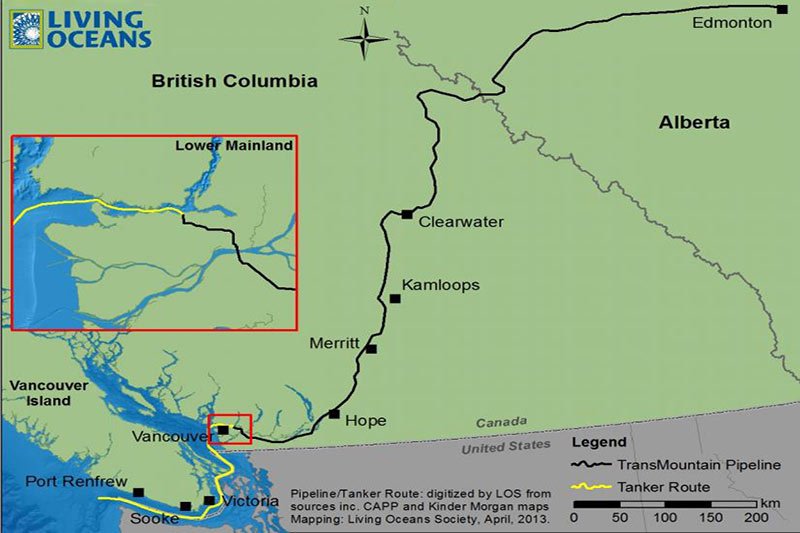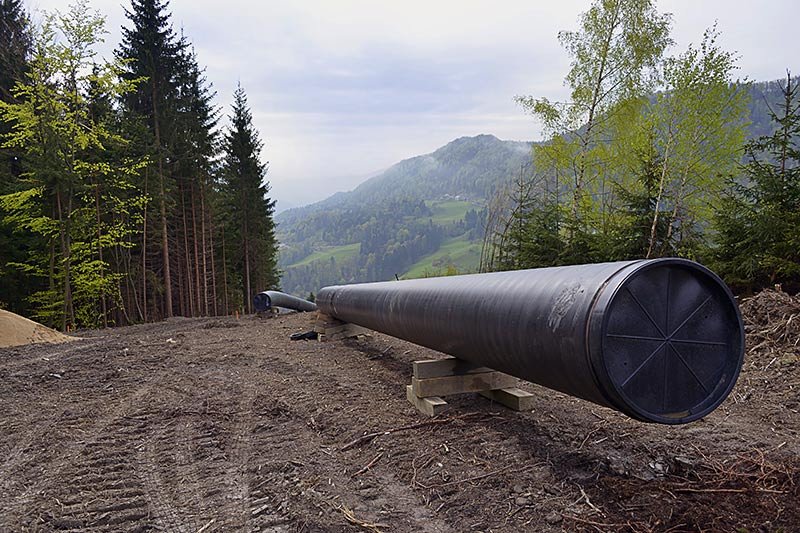
Trans Mountain Pipeline’s evidence exaggerates benefits and ignores costs
VANCOUVER—A new study prepared by Simon Fraser University observes that costs to build the Trans Mountain Expansion Pipeline (TMEP) have risen by $1.3 billion and concludes that, rather than making money for Canada, the pipeline would now actually cost Canadians an estimated $7.4 billion. Oil producers would find lower costs shipping undiluted bitumen by rail; and Canada as a whole would come out ahead if the pipeline were not built.
The SFU study was led by Dr. Tom Gunton and commissioned by Living Oceans Society and two other intervenors for the National Energy Board hearings on the TMEP, to evaluate new evidence submitted by Kinder Morgan. The company’s evidence had to be replaced because its author, Steven Kelly, was appointed to a seven-year term on the NEB by Stephen Harper on the eve of the federal election.
“We expected that Kinder Morgan would take a much more realistic approach to estimating benefits after they were given a second chance to file evidence of the potential value of the project to Canadians, with the additional benefit of having seen the analysis of Dr. Gunton’s team,” said Karen Wristen, Executive Director of Living Oceans Society. “Yet the new evidence filed for TMEP continues to present only the most optimistic estimates of future price and production levels, while excluding any consideration of the costs the project represents to the economy and to society.”
The SFU study also criticizes Kinder Morgan for exaggerating the benefits and not including environmental and unused pipeline capacity costs in its analysis.
The majority of the $7.4 billion cost attributed to the proposal is the unnecessary investment in new pipeline capacity. “Even taking Northern Gateway and Keystone XL out of the forecast and using the most optimistic predictions of future oil production from the Canadian Association of Petroleum Producers, building the TMEP along with other proposed projects would result in excess pipeline capacity until 2034,” said Dr. Gunton. “Under the CAPP low production scenarios, TMEP will never be needed.”
The study estimates that environmental costs of the Kinder Morgan project would exceed $3.07 billion. “We cost out oil spill damages, air pollution, greenhouse gas emissions and passive use damages because there are reasonably reliable methods for estimating these costs,” Gunton said. “The result is conservative, in that it omits a number of environmental impacts that are more difficult to evaluate.”
“We appreciate that the full costs and benefits of such a large project are difficult to predict in volatile markets,” said Wristen. “But the TMEP evidence continues to calculate benefits on the basis of an oil price holding at over $100 bbl for the next 20 years. In the face of market volatility and a government committed to action on climate change, that assumption is completely unwarranted.”
Source Article: Living Oceans Society Media Release, December 4, 2015. View Online.
Living Oceans Society
Vancouver & Sointula, British Columbia
Website: www.livingoceans.org
Media Enquiries: Karen Wristen, Executive Director, 604-788-5634
Photo Credit: www.BritishColumbia.com

Background
The SFU study entitled, Public Interest Evaluation of the Trans Mountain Expansion Project, was prepared for Living Oceans Society and two other intervenors by Thomas Gunton, Sean Broadbent, Chris Joseph and James Hoffele.
The study reviews the economic case made by Kinder Morgan (Trans Mountain Pipeline ULC, or ‘TM’) for its Trans Mountain Expansion Project (TMEP) and concludes:
The evidence in the TMEP application that the TMEP is required and in the public interest is incomplete and deficient in the following respects:
- a) TM overstates project benefits by using gross economic impacts as the primary measure of the contribution of the project to the public interest instead of net impacts and net economic benefits;
- b) TM incorrectly assumes that economic impacts are a measure of benefits without taking into account the opportunity cost of the labour, capital and other resources it uses;
- c) TM’s conclusion that the TMEP will generate significant benefits in the form of increased prices for Canadian oil exports is based on a questionable methodology, unrealistic assumptions, and is inconsistent with oil market dynamics;
- d) TM’s assessment of the need for the TMEP is deficient because it underestimates WCSB transportation capacity, likely overestimates oil production and oil prices, and does not include alternative production and transportation capacity scenarios; and
- e) TM fails to provide any benefit cost analysis undertaken in accordance with well-established principles and guidelines, and does not set out in a clear and comprehensive way the advantages, disadvantages, and trade-offs of its proposed project as is necessary for determining whether the TMEP is in the public interest.
The study goes on to conduct a benefit cost analysis of the project and concludes:
- a) Under base case assumptions the TMEP results in a net cost to Canada of $7.4 billion.
- b) to address uncertainty in estimating benefits and costs of the TMEP, a large number of sensitivity analyses were conducted to test the impact of alternative assumptions. Under all scenarios tested, the analysis shows that the TMEP will result in a net cost to Canada that ranges between $4.6 and $23.0 billion.






